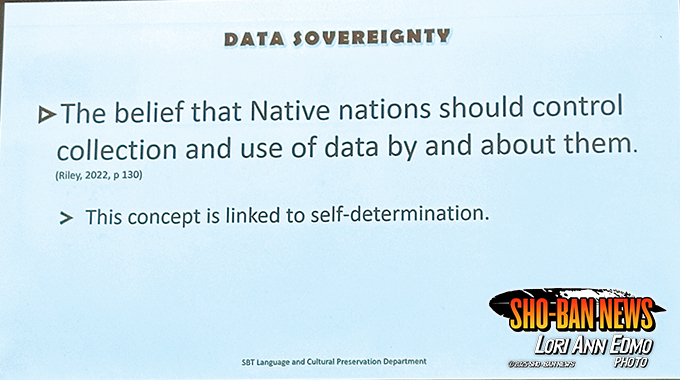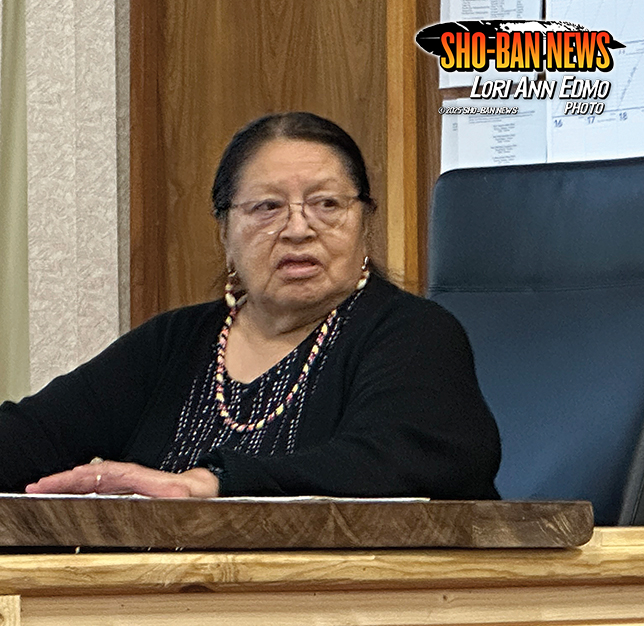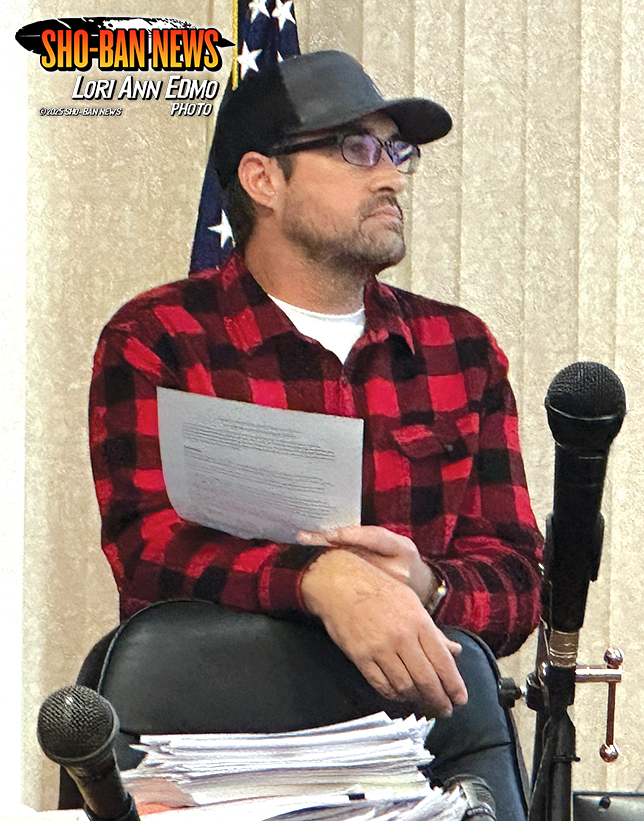Sho-Ban Tribes Artificial Intelligence Policy discussed at LCPD Brown Bag lunch series

Data sovereignty slideshow presentation at the LCPD Brown Bag lunch series on November 13.
By LORI ANN EDMO
Sho-Ban News
FORT HALL — In the interest of protecting the Shoshone-Bannock Tribes data, an Artificial Intelligence Policy is being proposed that will be sent to all tribal departments.
Artificial Intelligence was the subject of the second Brown Bag series the Tribes Language and Culture Preservation Department hosted November 13 for Native American Heritage Month.
Louise Dixey, LCPD director, said she drafted the policy because implementing artificial intelligence must be governed by clear policies to ensure ethical use, Tribal data protection and transparency. The AI policy outlines the principles and guidelines for the responsible and respectful us of AI with the Tribes.
Definitions include: Artificial Intelligence (AI) – a set of technologies that enable computers and machines to simulate learning, comprehension, problem-solving, decision-making, creativity and autonomy.
Generative AI – sometimes called genAI, is a type of artificial intelligence that can create original content such as text, images, videos, audio, or software code in response to a user’s prompt or request.
Large Language Model (LLM) is a type of artificial intelligence designed to understand and generate human-like text based on the patterns and structures it has learned from vast amounts of language data. These models are trained using advanced machine learning techniques and are capable of tasks such as answering questions, generating creative content, summarizing text, translating languages, and more. Examples include AI systems used for natural language understanding and generation, like Microsoft CoPilot.
Machine Learning is a branch of artificial intelligence (AI) that focuses on developing algorithms and systems that allow computers to learn from and make decisions or predictions based on data without being explicitly programmed for every task. Instead of following predefined rules, machine learning models identify patterns in data and use these patterns to improve their performance over time.

LCPD Director Louise Dixey
Dixey explained she didn’t get the opportunity to develop the policy for data sovereignty but it’s determining what type of data should be utilized such as use of our language, place names, our historic history – what type of information can be shared and should be shared with outside bodies.
She said artificial intelligence has become an important part of modern technology, it offers benefits, but LCPD believes it should be guided by clear policies. She’s aware one tribal department is utilizing an unlicensed version of AI to create reports on natural resources. That’s concerning to her.
The Cherokee Nation is one tribe that has an extensive AI policy and they have a board that determines how it can be used and what platforms can be used to implement AI in reviewing tribal data.
Nolan Brown, Original Territories Historic Research manager, said he’s had work experience with AI, but he doesn’t have a special background in computer science. Observations of things have gained their attention at LCPD and they see the need to protect tribal data. He showed a PowerPoint slide from Angela Riley, a tribal citizen of the Potawatomi Nation – “The belief that Native nations should control collection and use of data by and about them.” The concept is linked to self-determination. He believes our people have always had that, “maintaining our data sovereignty by keeping our language alive, keeping our teachings and practices alive within our people, sharing them orally through our oral tradition,” he said. “And then only recently it's come to the point where we need to start writing some of those principles down, some of that deniwape (tribal teachings) that we have. And then when that happens, we have to protect it or we have to be careful and be mindful about those opportunities that outsiders look for to gather our information and use it for their own purposes.”
He explained LCPD had the opportunity to obtain a National Science Foundation grant but after looking into the fine print, at the end of the grant they would have had to turn all their information over to them so the government could use in their artificial intelligence systems — they turned it down. He said caution should be used in large language models – you can put a question and through whatever processes it has, takes an answer that seems like its correct, but it might be wrong too. “So, there's dangers of large language models hallucinating, but also the fact that our languages are in danger,” he continued. If AI got a hold of the Tribes language dictionaries or work then have AI speaking or at least the appearance of speaking using our language, something given by dammah uppa (Creator) then being used by whomever or in whatever fashion that’s something to be very careful about. That is why a policy is needed to protect things like that but all tribal data or even images of the Fort Hall Reservation.
Brown talked about seeing images on Google Earth or Google Maps in street view where Google has already crisscrossed the rez recording everybody’s homes. “Somebody even had the nerve to go into our Sundance lodge and record a 360 panoramic image and post that onto the Google Street View. So that's something that people can look at now — enter into our lodge digitally with those images and see. And that's very disturbing to me,” Brown said he reported it to the Fort Hall Business Council and Bill Bacon, tribal attorney. A tribal law is needed to prevent it from happening as currently it’s just trespassing.
However, he’s used an AI program called Mid Journey to develop a proposed rendering for a cultural center so that’s something positive. He noted some designs generated in AI are stereotypical. The downside of AI is the data centers where it’s generated, uses a lot of water for cooling systems – it pollutes water, creates waste water and depletes whatever water sources they’re using.
Dixey said she asked language teacher Zelphia Towersap about AI ,what she thought and her response was kai tsopeegee kayu that means you have no brains. She explained to her it’s a computer doing your thinking and spinning something back. Zel said we’re going to have a computer to think for us. There are no terms in either Shoshone or Bannock for AI.
FHBC Treasurer Ladd Edmo said he attended a session at the University of Idaho about TIP – tribal intellectual properties where tribes need to develop policies to protect their rights. “This data goes out there and what AI will do with it, from what I heard and understood was that if you publish this stuff and it does not got a patent or a trademark or what have you, ownership, and the tribes has that option and that's what most of the discussion was about, tribes becoming aware of this and putting their name on it and owning it,” Ladd said. “But if we don't, then AI gets a hold of it and whoever takes that information and used it, they could technically keep it as their own, put their name and brand on it, but yet it's our data. And that was unacceptable to me, and I think we should all feel that same way. So that's what I learned at that part of it.”

Energy Department Manager Wyatt Petersen
Wyatt Petersen, Tribal Department of Energy manager, said AI is going to impact us. He said developing the AI tribal policy is an important early step. He would like to see the draft policy work through the tribal departments.
Bailey Dann, Original Territories Researcher, said when we start distorting reality and if we rely on something that is artificial, we as human beings are meant to be learning, doing and making. “But if we let someone else do that and someone else is making money off of that, and then we're carving ourselves out. And you know, we're kind of making ourselves not, you, not a part of the world.”
“And so, you're not being true to yourself or your ancestor,” she continued, and we're gonna lose that connection. So, it's right there in the name, artificial intelligence. She said, “We're really brilliant people, we're really smart people. We come from really strong people. And I think it does a disservice to our past leaders and past ancestors who brought us to this moment,” Dann said.
“If we start to rely on something that's fake, I think that's something to consider. In addition to the environmental harms that AI and these data cents do to our lands, to our animals, migration roots, everything's connected. So, I think we have to be serious in considering our use in our relationship with artificial intelligence and not be complacent and just accept it,” she said.
The draft AI policy reads it will apply to all employees, contractors, agents and third-party vendors who use AI tools and technologies in their course of work for the Shoshone-Bannock Tribes. It should be read in conjunction with all other Shoshone-Bannock tribal policies.





